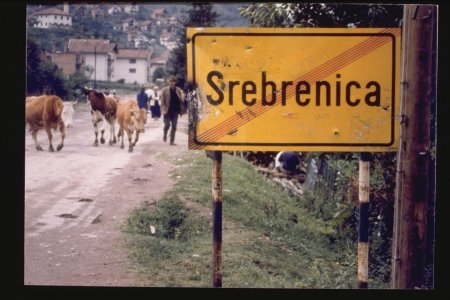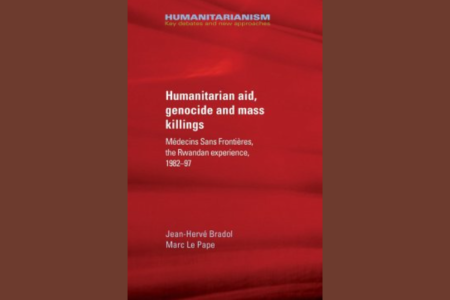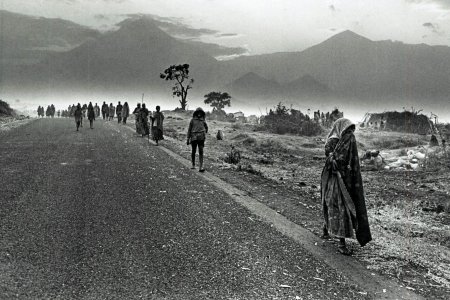
Listen to the MSF Speaking Out podcast: “The Hunting and Killing of Rwandan refugees in Zaire-Congo 1996-1997”.
Laurence Binet
MSF releases the podcast “MSF Speaking Out: The Hunting and Killing of Rwandan refugees in Zaire-Congo 1996-1997” describing the dilemmas, challenges and controversies faced by the MSF teams including: could MSF communicate publicly on the health condition of the refugees when its access to them had recently been denied? When it realised its teams were being used to lure and kill refugees, should the organisation cease its activities and condemn this manipulation?
This podcast, available in English and French and developed in collaboration with MSF UK and MSF France, is adapted from the original MSF Speaking Out Case Study : “The Hunting and Killing of Rwandan Refugees in Zaire-Congo. 1996-1997”.
The series comprised of 8 episodes investigates MSF's experience in the aftermath of the 1994 Rwandan Tutsi genocide, in particular the impact on local populations and refugees living in Zaire (now Democratic Republic of Congo).
Through MSF press releases, internal reports, news articles and eyewitness testimonies from MSF staff, the podcast explains how MSF tries to publicise the situations faced by its teams while examining some of the dilemmas, challenges, and controversies, they encountered.
Should the MSF teams speak out about the fate of refugees they can’t see; in a region they can’t work in?
The war is breaking out between Rwanda and Zaire. Most of the refugees fleeing to Zaire are civilians who left Rwanda when the Rwandan Patriotic Front took over the government after the genocide of Rwandan Tutsis in 1994.
As the army of the new Rwandan regime, allied with the rebels of the Alliance of Democratic Forces for the Liberation of Congo-Zaïre attacks the refugee camps and the instability of the region increases, MSF and other humanitarian organisations are eventually forced out of eastern Zaire and partly lose access to refugees. MSF suspects that thousands of refugees are at risk of dying in the refugee camps or as they flee, as a result of dangerously low food supplies and scarce medical care.
To appeal for its access to help refugees, MSF France puts out a press release titled ‘Are 13,600 Deaths Insignificant?’. This figure is an extrapolation based on the mortality recorded during the first weeks of forced displacement of these populations.
This extrapolation of the number of deaths by MSF provokes a backlash from the international press that denies the massacres of Rwandan refugees committed by the Rwandan troops and the Zairian rebellion. One of the criticisms levelled at MSF and others is that they are overexaggerating the crisis to raise funds.
To respond to criticism MSF France’s Communications Director writes in a French newspaper: “Perhaps we were wrong for being prematurely right. Even if we have to treat our projections with care, medical practice requires that we make them. It is an absolute precondition for implementing a prevention policy.”
This controversy leads the teams at MSF to question: when MSF has no permanent access to the refugees themselves, can and should the organisation publicly make predictions about the refugees’ health condition and need for medical assistance?
Should MSF cease its activities and condemn the manipulation once realising it is used as bait to hunt and kill refugees?
MSF exploratory teams are confronted with mounting evidence that refugees are being massacred by the Alliance forces and their Rwandan allies. They then begin to realise that a more serious dilemma is being created by their very presence in the Kivus - sometimes humanitarian teams are actually being used to lure refugees and kill them.
The MSF Emergency inter-sections Team Coordinator in South Kivu reports: “We went to several locations, identified the refugees, came back to the base in Bukavu, tried to go back a second day and then there were security problems that did not allow us to return. The military stopped us, and we couldn't find that group of refugees ever again, so we started getting very, very, very suspicious.”
This dilemma prompts intense debates within MSF: should MSF stop their activities in the area or continue them, condemning manipulation in the hope of preventing massacres? Or by doing this, do they run the risk of endangering the refugees, the MSF teams and other operations in the region?
To learn more about the MSF Speaking Out Case Studies: https://www.msf.org/speakingout
To cite this content :
Laurence Binet, “Listen to the MSF Speaking Out podcast: “The Hunting and Killing of Rwandan refugees in Zaire-Congo 1996-1997”.”, 5 janvier 2023, URL : https://msf-crash.org/en/blog/humanitarian-actors-and-practices/listen-msf-speaking-out-podcast-hunting-and-killing-rwandan
If you would like to comment on this article, you can find us on social media or contact us here:
Contribute



Add new comment